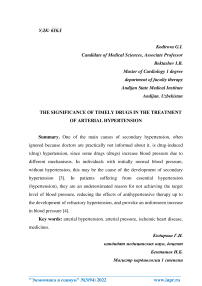The significance of timely drugs in the treatment of arterial hypertension
Автор: Kodirova G.I., Bektashev I.B.
Журнал: Экономика и социум @ekonomika-socium
Рубрика: Основной раздел
Статья в выпуске: 3-2 (94), 2022 года.
Бесплатный доступ
One of the main causes of secondary hypertension, often ignored because doctors are practically not informed about it, is drug-induced (drug) hypertension, since some drugs (drugs) increase blood pressure due to different mechanisms. In individuals with initially normal blood pressure, without hypertension, this may be the cause of the development of secondary hypertension [3]. In patients suffering from essential hypertension (hypertension), they are an underestimated reason for not achieving the target level of blood pressure, reducing the effects of antihypertensive therapy up to the development of refractory hypertension, and provoke an unforeseen increase in blood pressure [4].
Arterial hypertension, ischemic heart disease, medicines, arterial pressure
Короткий адрес: https://sciup.org/140291395
IDR: 140291395 | УДК: 616.1
Текст научной статьи The significance of timely drugs in the treatment of arterial hypertension
Relevance. The prevalence of arterial hypertension (AH) has increased markedly in recent years, and in the future its growth will continue, primarily due to an increase in life expectancy, and also due to an increase in the number of obese patients, which is one of the main risk factors for high blood pressure. (AD) [2].
One of the main causes of secondary hypertension, often ignored because doctors are practically not informed about it, is drug-induced (drug) hypertension, since some drugs (drugs) increase blood pressure due to different mechanisms. In individuals with initially normal blood pressure, without hypertension, this may be the cause of the development of secondary hypertension [3]. In patients suffering from essential hypertension (hypertension), they are an underestimated reason for not achieving the target level of blood pressure, reducing the effects of antihypertensive therapy up to the development of refractory hypertension, and provoke an unforeseen increase in blood pressure [4].
These drugs can be both over-the-counter, i.e. freely sold in pharmacies, and prescription, prescribed by a doctor for acute or chronic diseases. Most often, drug-induced hypertension is caused by steroids, non-steroidal antiinflammatory drugs (NSAIDs), sympathomimetic drugs, central nervous system (CNS) stimulants - alcohol, amphetamine, other therapeutic drugs (sibutramine, antiemetics, physostigmine, levodopa, leflunomide , growth hormone, thyroid hormones, recombinant human erythropoietin), antidepressants, immunosuppressants, antiangiogenic drugs, anesthetics, heavy metals, toxins, and even some nutritional supplements (ginseng, liquorice, etc.) [1].
Purpose of the study . Comparative evaluation of the effectiveness of therapy with fixed combination drugs fozid and lozap plus and the rationale for their use in patients with arterial hypertension of 1-2 degrees.
Materials and research methods. Prolonged therapy with fozid and lozap plus in patients with 1-2 degree hypertension provides reliable; a uniform hypotensive effect for 24 hours and has a multifaceted corrective effect on the dynamics of daily monitoring4 blood pressure indicators: average daily values of systolic blood pressure, average daily values of diastolic blood pressure, the magnitude of the morning rise in blood pressure, blood pressure variability, the time index: hypertension-Lozap plus is more pronounced; than fozid reduces FOS. Both drugs are well tolerated.
Long-term use of fozid and lozap plus has a positive effect on the structural state of the left ventricle, improves systolic and diastolic functions of the heart. Lozap; plus, compared with fozidom, it more significantly reduces the mass of the myocardium of the left ventricle (LVMI).
Therapy with fozid in comparison with lozap plus more significantly reduces the manifestations of atherosclerosis of the carotid arteries, contributing to the regression of the size of the intima-media complex of the common carotid artery.
Microalbuminuria was detected in 82.2% of the studied patients with 1-2 degree AH. Phosid and lozap therapy? plus; significantly reduces the level of MAU, the initially increased glomerular filtration rate and does not worsen it at normal values. Unlike lozap plus, fozid more significantly reduces the level of MAU.
The intake of fozida and lozap plus helps to improve the lipid spectrum, without adversely affecting the parameters of carbohydrate, electrolyte metabolism and creatinine levels.
Long-term therapy with both drugs has a positive effect on the quality of life of patients with 1-2 degree hypertension, having a beneficial effect on all subspheres and not leading to a deterioration in any of them, which contributes to greater adherence to treatment.
Output. The results of the study substantiate the possibility of differentiated use of fozida and lozap plus as pathogenetic therapy drugs in hypertensive patients with target organ damage.
To identify target organ damage and the choice of: antihypertensive therapy in patients with hypertension, a comprehensive examination of patients is necessary: assessment of the initial parameters of the daily blood pressure profile, intracardiac hemodynamics, determination of the magnitude of the intima-media complex of the common carotid artery and the level of microalbuminuria.
Based on the results of a comparative analysis, criteria for prescribing fozid and lozap plus for patients with hypertension are proposed. With left ventricular hypertrophy, a tendency to tachycardia, the appointment of lozap plus is recommended.
Список литературы The significance of timely drugs in the treatment of arterial hypertension
- Arutyunov G.P. Pharmacotherapy of arterial hypertension: place of fixed drug combinations / G.P. Arutyunov, A.V. Rozanov // Consiliummedicum. Appendix "Hypertension" 2013.-T.9.-№6.- S. 109-116.
- Sturov, N.V. ACE inhibitors: experience of the most significant clinical trials for clinical practice / N.V. Sturov // Difficult patient. Cardiology-2016 - V.4.-No. 4-S.Z-7.
- Waeber, B. Treatment strategy to control blood, pressure optimally in hypertensive patients / B. Waeber //j. Blood Press. 2011. - V.10. - P.62-73.
- Zanchetti, A. Perindopril. First-line treatment for hypertension / A. Zanchetti, P. Desche // Clin. Exp. Ther. Pract. 2009. - All. - P.555-573.


